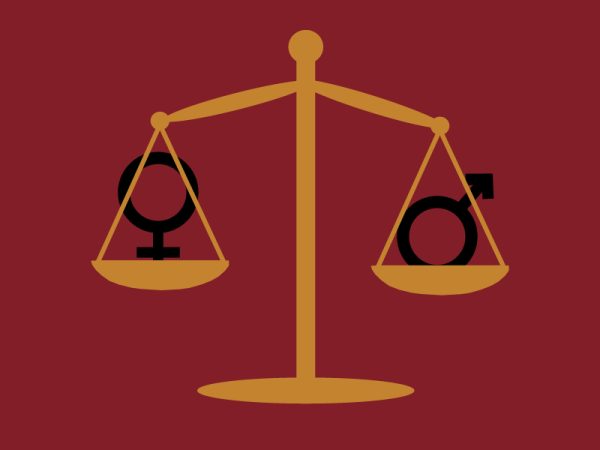The masquerading of states’ rights
September 18, 2022
The centuries-old power struggle between the sovereignty of states and the federal government to which they pledge fealty has given rise to great schisms in American democracy and ideals. The overturning of Roe v. Wade under the guise of states’ rights could mark the onset of a wave of similar conservative judicial actions aimed at unraveling the civil liberties of Americans under similar pretenses. Since the Supreme Court’s ruling, several states have moved to criminalize abortions, opening the door for prosecuting patients and health care providers alike.
In the months since the United States Supreme Court’s momentous and unprecedented overturning of Roe v. Wade, several states have demonstrated their espousal of the doctrine of states’ rights by holding referendums aimed at either enshrining abortion protections or banning them with few exceptions. However, the conservative plan to thwart American women’s access to reproductive rights appears to be falling short in some states. Abortion is widely popular among Americans irrespective of political affiliation and referendums are reaffirming this stance with stark clarity. Most notably in Kansas, a firmly red state, Americans have voted against criminalizing reproductive healthcare. The pro-life Value Them Both amendment which, in the spirit of states’ rights, was put before Kansans on Aug. 2, 2022, lost by a margin of 165,389 votes. The failure of the proposed amendment means that abortion rights will be securely cemented into Kansas’ Constitution. Kansas is the first of several states where abortion is on the ballot. Reproductive rights and its supporters in California, Vermont and likely Michigan will face similar tribulations in November.
Roe v. Wade stood on the legal principle of substantive due process. This precedent, deriving from the Fifth and 14th Amendments, affirms that courts could shield citizens’ rights from legislative or executive interference regardless of if the rights in question remain unenumerated elsewhere in the Constitution. With the fall of Roe, this principle is jeopardized and other SCOTUS cases with a legal basis in the aforementioned principle may be in peril.
Justice Clarence Thomas rather plainly stated his opinion on substantive due process by calling for erroneous rulings based on this precedent to be re-litigated. What is a cause for grave concern is the precedent set by Roe is the foundation for Griswold v. Connecticut, 381 U.S. 479 (1965), the protection of contraceptives; Loving v. Virginia, 388 U.S. 1 (1967), the protection of interracial marriages; and Obergefell v. Hodges, 576 U.S. 644 (2015), the protection of same-sex marriages. The current conservative super-majority Supreme Court has adopted a capricious attitude towards stare decisis, a legal principle mandating that courts respect precedent, thus endangering the civil liberties of Americans who merely dare to seek equal protection under the law. The proponents of states’ rights would have you believe that these rulings should be left up to the individual states to decide as opposed to the federal government wielding sweeping power. This, however, is but a mask for their more nefarious and less palatable motivations.
If the ideologues upholding the facade of states’ rights were honest in their intentions then one would expect them to be content with the outcomes that resulted from the democratic referendums they fought for. This is demonstrably not the case. Ever vituperative in their opposition, Value Them Both advocates have called for a recount in the Kansas referendum under the pretenses of election integrity, a phenomenon that is becoming all too common in the modern American political landscape. Despite the large margin of defeat, supporters have amassed $119,000 for recounts in nine counties in Kansas. Furthermore, right-wing media has struggled to spin together a coherent message coming out of the referendum that aligns with both its indefensible pro-life biases as well as its defense of states’ rights. These are not the actions of safeguarders of democracy protecting the liberties of the people and the sovereignty of state governments from overreaching federal tyrants that they purport themselves to be, but rather oppressive demagogues pushing archaic and unpopular views on the unwilling masses. Nevertheless, even if you accept the states’ rights argument at face value, it must be acknowledged that leaving the prerogative to the states hasn’t historically always led to morally defensible solutions. Remember, it was states’ rights that propagated slavery and Jim Crow laws. If states cannot be entrusted to protect the basic tenets of liberty and equality, then how can they be entrusted to protect reproductive healthcare, much less same-sex marriage or contraceptive protection?
It is imperative that Northeastern students show their support for reproductive rights and other liberties that may fall victim to the states’ rights ideal. There are a wide array of student organizations — like NU Share and the Progressive Student Alliance — that students may partake in to better educate themselves and catalyze action within the Northeastern community and Boston in general. It falls upon us to ensure that the unelected, unaccountable judiciary does not trample our freedoms in the name of bigotry under the false flag of states’ rights.
Gabriel Holder is a second-year majoring in behavioral neuroscience. He can be reached at [email protected].


















